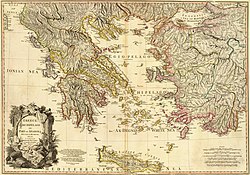 Global Information
Global InformationHellenistic period information
It has been suggested that Hellenistic Greece be merged into this article. (Discuss) Proposed since January 2024. |

| History of Greece |
|---|
 |
|
|
In classical antiquity, the Hellenistic period covers the time in Mediterranean history after Classical Greece, between the death of Alexander the Great in 323 BC and the death of Cleopatra VII (30 BC),[1] followed by the emergence of the Roman Empire, as signified by the Battle of Actium in 31 BC and the conquest of Ptolemaic Egypt the following year.[2][3] The Ancient Greek word Hellas (Ἑλλάς, Hellás) was gradually recognized as the name for Greece, from which the word Hellenistic was derived.[4] "Hellenistic" is distinguished from "Hellenic" in that the latter refers to Greece itself, while the former encompasses all ancient territories under Greek influence, in particular the East after the conquests of Alexander the Great.
After the Macedonian conquest of the Achaemenid Empire in 330 BC and its disintegration shortly after, the Hellenistic kingdoms were established throughout south-west Asia (Seleucid Empire, Kingdom of Pergamon), north-east Africa (Ptolemaic Kingdom) and South Asia (Greco-Bactrian Kingdom, Indo-Greek Kingdom).[5][6] This resulted in an influx of Greek colonists and the export of Greek culture and language to these new realms, spanning as far as modern-day India. These new kingdoms were also influenced by the indigenous cultures, adopting local practices where beneficial, necessary, or convenient. Hellenistic culture thus represents a fusion of the ancient Greek world with that of Western Asian, Northeastern African, and Southwestern Asian.[7] This mixture gave rise to a common Attic-based Greek dialect, known as Koine Greek, which became the lingua franca throughout the ancient world.
During the Hellenistic period, Greek cultural influence and power reached its peak in the Mediterranean and beyond. Prosperity and progress in the arts, literature, theatre, architecture, music, mathematics, philosophy, and science characterize the era. The Hellenistic period saw the rise of New Comedy, Alexandrian poetry, translation efforts such as the Septuagint, and the philosophies of Stoicism, Epicureanism, and Pyrrhonism. In science, the works of the mathematician Euclid and the polymath Archimedes are exemplary. Sculpture during this period was characterized by intense emotion and dynamic movement, as seen in works like the Dying Gaul and the Venus De Milo. Hellenistic architecture emphasized grand monuments and ornate decorations, exemplified by structures such as the Pergamon Altar. The religious sphere expanded to include new gods such as the Greco-Egyptian Serapis, eastern deities such as Attis and Cybele, and a syncretism between Hellenistic culture and Buddhism in Bactria and Northwest India.
Scholars and historians are divided as to which event signals the end of the Hellenistic era. Proposals include the final conquest of the Greek heartlands by Rome in 146 BC following the Achaean War, the final defeat of the Ptolemaic Kingdom at the Battle of Actium in 31 BC, and the move by Roman emperor Constantine the Great of the capital of the Roman Empire to Constantinople in AD 330.[8][9] Angelos Chaniotis ends the Hellenistic period with the death of Hadrian in AD 138, who integrated the Greeks fully into the Roman Empire, though a range from c. 321 BC to AD 256 may also be given.[10][11]
- ^ [CHAMBERS Dictionary of WORLD HISTORY]
- ^ Art of the Hellenistic Age and the Hellenistic Tradition. Heilbrunn Timeline of Art History, Metropolitan Museum of Art, 2013. Retrieved 27 May 2013. Archived here.
- ^ Hellenistic Age. Encyclopædia Britannica, 2013. Retrieved 27 May 2013. Archived here.
- ^ "Alexander the Great and the Hellenistic Age". www.penfield.edu. Retrieved 2017-10-08.
- ^ Professor Gerhard Rempel, Hellenistic Civilization (Western New England College) Archived 2008-07-05 at the Wayback Machine.
- ^ Ulrich Wilcken, Griechische Geschichte im Rahmen der Altertumsgeschichte.
- ^ Green 2008, pp. xv–xvii.
- ^ "Hellenistic Age". Encyclopædia Britannica Online. Encyclopædia Britannica, Inc. Retrieved 8 September 2012.
- ^ Green, P (2008). Alexander The Great and the Hellenistic Age. Phoenix. p. xiii. ISBN 978-0-7538-2413-9.
- ^ Chaniotis, Angelos (2018). Age of Conquests: The Greek World from Alexander to Hadrian. Cambridge, MA: Harvard University Press. p. 4.
- ^ Anderson, Terence J.; Twining, William (2015). "Law and archaeology: Modified Wigmorean Analysis". In Chapman, Robert; Wylie, Alison (eds.). Material Evidence: Learning from Archaeological Practice. Abingdon, UK; New York, NY: Routledge. p. 290. ISBN 978-1-317-57622-8. Retrieved 20 August 2019.